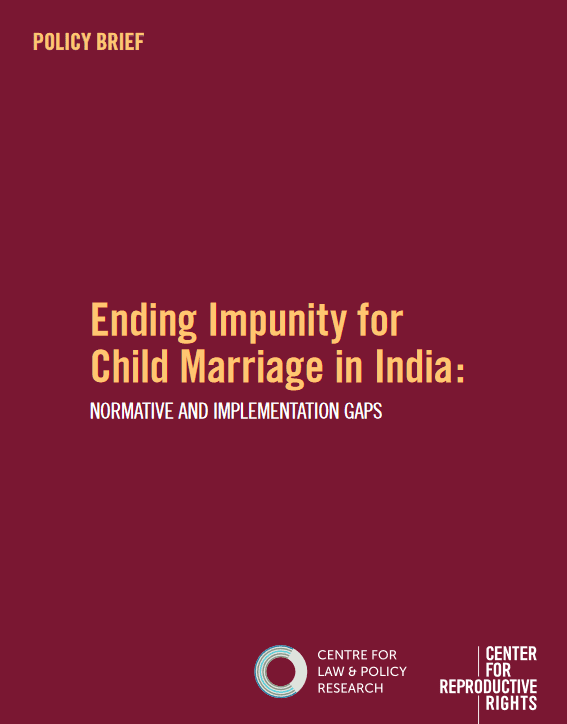Child Marriage in South Asia: Stop the Impunity (Press Release)
Center for Reproductive Rights Details Human Rights Violations Against Girls and Women Stemming From Child Marriage
(PRESS RELEASE) Despite international and local laws clearly condemning child marriage, South Asian countries refuse to address this illegal practice which could lead to a projected 130 million young girls married against their will by 2030, according to a new publication by the Center for Reproductive Rights.
Child Marriage in South Asia: Stop the Impunity focuses on the violations of women’s and girls’ reproductive and fundamental human rights that stem from child marriage in the region. Twenty-five thousand children worldwide, most of whom are girls, are married every day— South Asia accounting for almost half of all child marriages.
The report details the failure of governments in South Asia to enact and enforce current laws that prohibit child marriage, which has led to these countries being responsible for violating young girls’ human rights.
“South Asian governments are standing silently by while countless young girls are married off against their will, and in violation of international human rights law,” said Melissa Upreti, regional director for Asia at the Center for Reproductive Rights.
“All governments must be held accountable for not meeting their legal and moral obligation to end child marriage.”
Given the high rate of child marriage in South Asia, the Center for Reproductive Rights focused its research of the practice to six countries in the region—Afghanistan, Bangladesh, India, Nepal, Pakistan and Sri Lanka. With the exception of Nepal, the report reveals a number of conflicting laws that have provided a loophole to allow child marriage—specifically failing to set a uniform minimum age of marriage.
The Center’s publication shows how child marriage can subject girls to heinous abuse, such as sexual violence and marital rape, placing their health and lives at serious risk. The pressure on these young brides to give birth very soon after marriage has led to early, closely spaced and frequent pregnancies that increase girls’ risk of maternal mortality and morbidity, including pregnancy-related complications—the leading cause of death among girls ages 15-19 worldwide, accounting for 70,000 deaths every year.
“Child marriage is not only casting aside young girls’ fundamental rights—it’s putting their health and lives at risk,” said Payal Shah, senior legal advisor for Asia at the Center.
On September 27 the United Nations Human Rights Council—principal body at the UN that promotes and protects human rights for all—adopted a procedural resolution dedicated to ending child marriage. Over 100 countries co-sponsored the resolution, however Nepal and Maldives are the only South Asian countries to sign on and the deadline is today, coinciding with the International Day of the Girl Child.
“Nepal, where the incidence of child marriage is quite high, has taken a bold step demonstrating their political will to put an end to child marriage. It’s time that other countries in South Asia struggling with this issue follow suit. It’s time we give the rights of girls the respect they legally deserve,” said Upreti.
Child Marriage in South Asia: Stop the Impunity consists of a briefing paper and fact sheet that serve as legal resources for human rights advocates and lawyers who want to hold their governments legally accountable for human rights violations resulting from child marriage.
The Center for Reproductive Rights has built a significant presence throughout Asia, with major initiatives addressing issues ranging from maternal mortality in India to access to modern contraception in the Philippines. The Center—which launched a regional office in Kathmandu, Nepal last year—has undertaken legal research, built local capacity and undertaken advocacy at the UN in relation to numerous countries in the region including Bangladesh, China, Indonesia, Malaysia, Pakistan, Sri Lanka, Thailand, and Vietnam.


